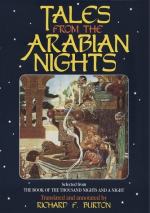“A voice divinely sweet,
a voice no less
Divinely sad.”
Nor does he mourn as they mourn who have no hope: he has an absolute conviction in future compensation; and, meanwhile, his lively poetic impulse, the poetry of ideas, not of formal verse, and his radiant innate idealism breathe a soul into the merest matter of squalid work-a-day life and awaken the sweetest harmonies of Nature epitomised in Humanity.
Such was the Moslem at a time when “the dark clouds of ignorance and superstition hung so thick on the intellectual horizon of Europe as to exclude every ray of learning that darted from the East and when all that was polite or elegant in literature was classed among the Studia Arabum"[FN#126] Nor is the shady side of the picture less notable. Our Arab at his worst is a mere barbarian who has not forgotten the savage. He is a model mixture of childishness and astuteness, of simplicity and cunning, concealing levity of mind under solemnity of aspect. His stolid instinctive conservatism grovels before the tyrant rule of routine, despite that turbulent and licentious independence which ever suggests revolt against the ruler: his mental torpidity, founded upon physical indolence, renders immediate action and all manner of exertion distasteful: his conscious weakness shows itself in overweening arrogance and intolerance. His crass and self-satisfied ignorance makes him glorify the most ignoble superstitions, while acts of revolting savagery are the natural results of a malignant fanaticism and a furious hatred of every creed beyond the pale of Al-Islam.
It must be confessed that these contrasts make a curious and interesting tout ensemble.
Section
I
the origin of the
nights.
A.—The Birth place.
Here occur the questions, Where and When was written and to Whom do we owe a prose-poem which, like the dramatic epos of Herodotus, has no equal?
I proceed to lay before the reader a proces-verbal of the sundry pleadings already in court as concisely as is compatible with intelligibility, furnishing him with references to original authorities and warning him that a fully-detailed account would fill a volume. Even my own reasons for decidedly taking one side and rejecting the other must be stated briefly. And before entering upon this subject I would distribute the prose-matter of our Recueil of Folk-lore under three heads




